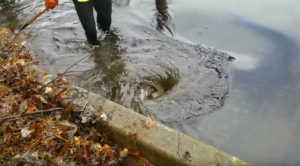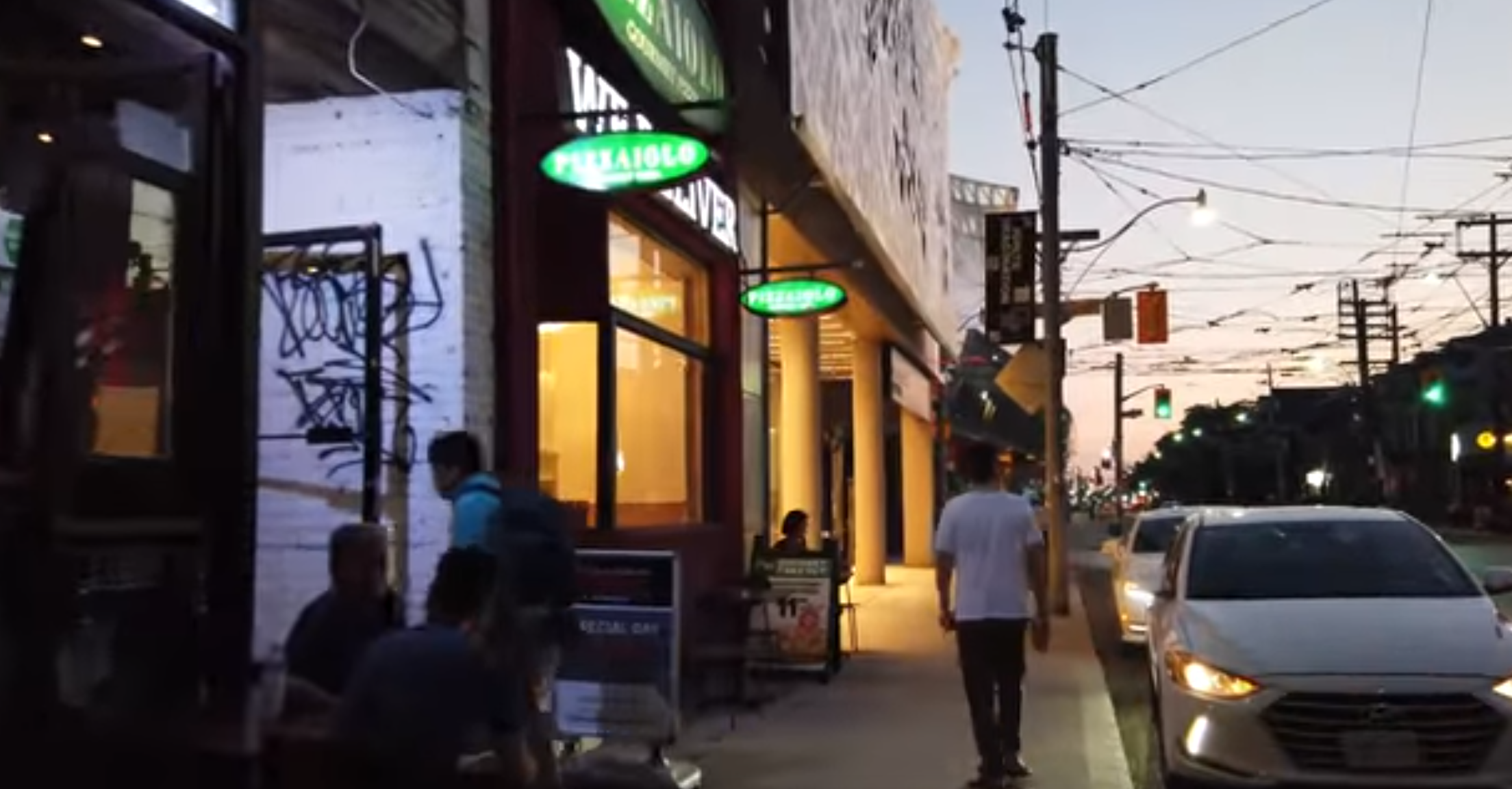Mike Wyeld (University of Hertfordshire) suggests a list of digital works rethinking how we use online video. In a time filled with public and private trauma and slow violence we might find solace in films designed to bring calm through easily achieved goals. Mike brings it together as “Low Stakes TV.”
Themed Playlist: Low Stakes TV; Cleaning Drains, Washing Cars and Long Walks

As film lovers, we have stories we return to again-and-again, films that provide comfort, where we find consolation. We use film to relieve our individual and collective problematic experience. After a hard day we might seek something to ameliorate the slow violence and trauma we encounter daily. Such trauma is often articulated in cinema, a medium which lends itself to common experience and emotion. Films, and their repeated viewing, reassure us that there are those who share our experience, that people have overcome troubles similar to ours. We flatter ourselves that our daily struggles are as complex as the ones on the screen.
We also use film when we want to feel good, or feel like dancing, the uses of screen evident in our choices. We watch and watch, our watching apparently expanded during Covid 19 lockdowns in 2020. Articulating conflict and resolution isn’t straightforward in a format like film that is expensive and contingent on so many factors. From finance to #metoo, we know that films don’t arrive for our consumption without complication.
In recent years online video has made it possible for a variety of new video modes and tropes to develop that address particular themes in our viewings. We can find video that speaks to our politics, subcultures, homesickness, hobbies, style journeys and more. Some of these might be considered formats or even genres in themselves, corresponding to how we might use them in our daily lives. These videos began life as a form of D.I.Y. Culture – like Queer, Punk and Feminist movements before – the makers of these videos have, at their core, a kind of self-reliance.
In The Political Possibility of Sound (Bloomsbury, 2019), Salome Voegelin boils down DIY culture like this, “D.I.Y. is a practice of self-reliance that rejects the idea of a right way to make a sound or to perform, and abandons the esoteric knowledge of the discipline and the profession in favour of a more contingent making, where virtuosity is replaced with commitment and value becomes a matter for the community…”(4).
Voegelin’s definition illuminates what I would like to call “Low Stakes TV.” In a well-crafted piece of Low Stakes Television, the audience is the key, the number of viewers not as essential as their engagement – they must be regular, committed viewers. In addition, the end game of the video has to be of almost low importance. In other types of story telling the MacGuffin is often forgotten and disappears into the background. In Low Stakes Television, it is the only thing.
The Worst Clog I Have Ever Seen (post 10, USA, 2019)
A young man wearing high visibility rain wear inhabits the edge of frame. He carries a rake and wades through muddy water. His extra high Wellington boots keep him standing statuesque against the elements. With the rake and his feet we see him pushing at something under the water, then there is a clear sucking sound and we see the distinct pattern of a whirlpool. After about 10 minutes the water level has fallen enough that we can see more detail of the edges of the pond, and the drain has been heroically cleared. After another hour of fussing and moving things under water, the pond has lowered considerably and our hero thanks us for watching and turns the camera off. A series of in-video options from his YouTube channel are presented – clearing a culvert, exploring a beaver dam and more…
This is the YouTube channel for post 10, a young filmmaker based in the United States who likes nothing more than to video himself clearing flooded parking lots, ponds and gardens. This video has been viewed over five million times.
He doesn’t mention politics, except for the occasional low-energy frustration at tasks the local government did not do correctly. He’s a little upset with them at times, and we agree, why does the local government not clear these drains more frequently? The stakes are low, very little drama, very little action, just the gentle water and gentle movement. We wait and watch, maybe the parking lot will drain, maybe it won’t. Let’s wait and see!
Where to look for it: https://youtu.be/1-zEvy3BaUw
Deep Cleaning The Nastiest Vehicle I’ve Ever Seen (The Detail Geek, Canada, 2020)
The Detail Geek cleans cars. Well, wait, he doesn’t just clean cars. SUVs, farm trucks and family Minivans come into his spotless garage filled with pet-hair covered cheeseburgers, and leave looking cleaner than the floor of the Vatican. Like post 10, the Detail Geek’s voice is calm, and regardless of what happens off camera, he has the feel of someone who loves what he does and wants to share it with us, gently. The music and his voice are designed for comfort. He invites us to “sit back, relax and enjoy the transformation.”
The collective views for The Detail Geek’s videos eclipses that for popular TV shows made by the BBC or HBO, many of which cost hundreds of thousands of UK pounds or more to make. His popularity comes without a PR team, without tabloid headlines, without ego. Just the video – the long, gentle, peaceful video.
The Detail Geek is a master of slow observation, his Canadian drawl pulling us into the action.
The people who clean cars like this (“detailing”) are experts in their field. In this film, he takes a Canadian Mom’s minivan, filled with hotdogs and French fries and makes it look brand new, showing us the sharp end of what it’s like to raise kids in the suburbs of Canada. The stakes aren’t so much low, as non-existent. They have been driving around with the minivan in this state for some time, it is obvious from the opening shots. If our hero doesn’t quite make it work, we, him and the van will survive. Just another day. But his achievement is glorious, we knew he could do it, and he does. We are on the journey with him.
Where to look for it: https://youtu.be/_z9Q9X1jHFE
Friday Night Walk in Downtown Toronto (Johnny Strides, Canada, 2020)
Chatting online with other subscribers to Johnny Strides channel I discover that like some of them, I watch YouTube through a Sony PS4, the convenience of which gives the feeling that online video channels occupy the same importance as anything broadcast on terrestrial tv or on HBO, Netflix or Apple TV. It’s just “what’s on” and the PS4 selects items from all the services on your home screen. Johnny Strides comes up next to ads for Toy Story 4 and RuPaul’s Drag Race. It feels like real tv watching this way. As if a team of executives had “green lit” Johnny’s channel and celebrated him the way they do Jordan Peele or Tina Fey.
In this piece, Johnny walks through the centre of Toronto on a warm summer’s evening as the sun is setting, past the first drinkers and diners to venture out as that city’s Covid 19 shutdown was eased. I was suggested one of Stride’s videos after I had searched for my high school on YouTube, feeling homesick as a result of not being able to return to my hometown during the Pandemic shutdown. The places he walks past are familiar, and the voices we hear briefly as he moves past them sound like old friends. He tells us where he is going, almost anticipating our questions as he goes. His voice is calm, his demeanour pleasant. He is the perfect accompaniment as I make a cup of tea, check my phone and tidy a stack of magazines. I sat back and reminisced and marvelled at how easy this all is. Slow down, take your time, walk with me. Cities the world over have similar treatments from dozens of other walkers. Johnny Strides is particularly good at this though.
Where to look for it: https://youtu.be/pZcKpivKu5Y
The NEW Caledonian Sleeper – London to Inverness (Paul Lucas, UK, 2020)
Low Stakes TV highlights one person’s observation and conjures experience into what we might think of as a kind of collective cinema, one person is doing it, but we all know what it is they are doing. We look to the individual maker of the work to tell us the story. Another mode of watching online, Slow TV, offers a similar but importantly distinct form of viewing. Slow TV eschews allowing us to view the film maker, and instead focusses on the action in the video, as such it is usually raw video of an activity, almost unmediated. It might be a 9-hour flight from Europe to America, or a 5-hour train journey through the Alps, but Slow TV is rarely narrated, rarely uses music, preferring instead a simple relationship between the camera and the viewer. For Low Stakes TV we can see the increasing detail of interactivity across social media. The makers interact with their audience. For Low Stakes TV, directing and editing are fundamental to the creation of the work.
In Paul Lucas’ videos we find ourselves on a variety of journeys, planes and trains, to exotic locations and experiences. He narrates constantly and edits across time and space to give us an impression of the journey but not the journey itself. It is a pleasant experience, that doesn’t demand your attention, but requests your company. We marvel across the videos that over time he has been able to find a living in his role as a host on wheels, telling us more about the journey than we might have observed ourselves had we been with him. And although his videos take the form of reviews very often, we don’t feel his discomfort on the journey any more than we feel the damp of the clogged drain in post 10’s work. His discomfort is mild.
Where to look for it: https://youtu.be/0AZPfYnRR-4
***
Mike Wyeld teaches Sound Design for Screen at the University of Hertfordshire and works as a sound designer for screen and gallery. His current touring show LOVED (www.loved.gallery) finds its next home in Provincetown Massachusetts in the summer of 2021, and recently featured in The Advocate Magazine (https://www.advocate.com/art/2020/7/16/loved-documents-lives-mostly-naked-bears#media-gallery-media-1 )
